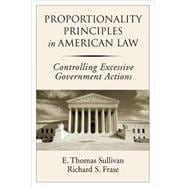
Note: Supplemental materials are not guaranteed with Rental or Used book purchases.
Purchase Benefits
What is included with this book?
| Introduction | p. 3 |
| Origins | |
| From the Annals of History to the Twenty-first Century | p. 13 |
| Proportionality in International and Foreign Law | p. 15 |
| Proportionality Principles in the Common Law of Damages | p. 37 |
| Proportionality In American Civil Jurisprudence | p. 51 |
| Implicit Proportionality Principles in American Standards of Constitutional Review | p. 53 |
| Explicit Proportionality Principles in Discrete Areas of American Jurisprudence | p. 67 |
| Proportionality In American Criminal Justice | p. 91 |
| Procedure Implicit Proportionality Limits on Police Powers and Defendant Rights | p. 95 |
| Criminal Law Implicit Proportionality Limitations on Criminal Liability | p. 115 |
| Punishment Explicit and Implicit Proportionality Limits on Sanction Severity | p. 129 |
| Conclusion | p. 169 |
| Notes | p. 175 |
| Subject Index | p. 251 |
| Case Index | p. 277 |
| Table of Contents provided by Ingram. All Rights Reserved. |
The New copy of this book will include any supplemental materials advertised. Please check the title of the book to determine if it should include any access cards, study guides, lab manuals, CDs, etc.
The Used, Rental and eBook copies of this book are not guaranteed to include any supplemental materials. Typically, only the book itself is included. This is true even if the title states it includes any access cards, study guides, lab manuals, CDs, etc.